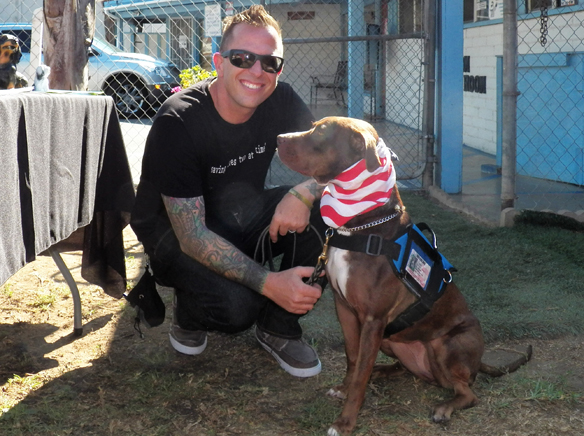Life is precious, but its value can be overshadowed when no purpose in life is immediately apparent. On Veterans Day, U.S. citizens pause in grateful remembrance honoring their fellow countrymen and -women, which through military service have defended life and liberty for others in the nation. But what happens when these protectors return from service wounded and injured, needing protection themselves? Those who rescue the rescuers are also deserving of appreciation and recognition.
Life is precious, but its value can be overshadowed when no purpose in life is immediately apparent. On Veterans Day, U.S. citizens pause in grateful remembrance honoring their fellow countrymen and -women, which through military service have defended life and liberty for others in the nation. But what happens when these protectors return from service wounded and injured, needing protection themselves? Those who rescue the rescuers are also deserving of appreciation and recognition.
Meet Graham Bloem, co-founder in September 2012 with his wife, Kyrié, of Shelter to Soldier, a non-profit organization dedicated to training psychiatric service dogs as protector-companions of Post 9/11 combat veterans diagnosed with the invisible wounds of post traumatic stress disorder and traumatic brain injury. On Nov. 10, Bloem and STS volunteers gathered for a Veterans Day eve graduation celebration with La Mesa Navy veteran Vic Martin, family, friends and supporters, to acknowledge official adoption of his new service dog, Kira.
Vic Martin served four years in the Navy on multiple deployments. In June 2012, Martin was serving in Bahrain as a Petty Officer Second Class, a “mine man” specializing in underwater explosives and ordnance when he collapsed suddenly. He was unconscious for an estimated 45 minutes to more than an hour. In an intensive care unit for 10 days, he was then medically evacuated to Balboa Naval Medical Center in San Diego, for recovery closer to his La Mesa home.
On awakening, Martin experienced trouble speaking and began a course of speech therapy. The extent of his injuries remained unknown until he attempted return to normal family errands. In a periodic episode of forgetfulness he left his wife, Kacy, and daughter behind in a shopping mall before driving home. He was afraid to walk outside. He felt anxious when the doorbell rang. Neurological testing revealed he experienced significant brain trauma from lack of oxygen. He had suffered an episode of frontal lobe hypoxia when his heart spasmed from a previously undiagnosed cardiac disorder. Martin retired on 100 percent medical disability.
“I went from having purpose in the Navy to having no purpose. I was lost. I felt alone,” he said.
Veterans Administration medical providers identified Martin as a “perfect candidate” for a service dog companion. But the Martin family, contending with Vic’s medical condition and retirement, had insufficient funds to pay the thousands necessary to train a service dog. Then, about six months ago, Martin’s wife, Kacy, discovered STS. With family support and urging, Vic Martin filled out an application and met with the organization’s board of directors. Then, he met Graham Bloem. “I have a dog in mind for you,” Bloem said.
The mission STS is described as “saving lives two at a time.” That, the group does, by pairing a dog unlikely to make its way alive out of a shelter with a combat veteran who has diminished contact with life from military service injuries.
The Veterans Administration places the post-service casualty rate at 22 to 23 U.S. military veterans committing suicide daily.
About 2.7 million dogs are put to death annually, for scarcity of adoptive homes and shelter space.
Kira, a 3 and one-half year old chocolate and white Labrador-pit mix, had encountered an uncertain fate herself. Her former owner, in legal trouble, was ready to surrender her to a shelter for likely euthanasia when Graham Bloem offered to take her instead and train her in the STS program.
Martin remembers his initial encounter with Kira as unimpressive, “just like meeting any dog for the first time.” He thought the dog was “aloof.” Graham Bloem pressed for another meeting, telling Martin that Kira loved Martin’s forsaken activity of hiking. “She’ll get you up and out of the house on a hike,” he said.
That second meeting was magic. “We had an instant connection, eye to eye,” Vic Martin recalls. “She came right up to me. I think she knew then that I would be coming back.”
Graham Bloem has been a dog trainer for 14 years, training service dogs specifically for the last decade. He and his wife became distressed over “turning away too many veterans” who needed service dogs, for not being able to pay. The result was their founding of STS. Although training, food, boarding and veterinary care costs amount to around $12,000 each, the organization provides any veteran in the program a service dog free of any charges.
Graham Bloem said 100 percent of donations go toward services, with STS accruing no administrative costs, as all trainers are volunteers.
STS currently has eight dogs enrolled in the program, with a goal of matching and placing 20 dogs with veteran partners by the beginning of 2016. Each STS dog receives a year of training, then subsequently trains with a partner veteran for four to five months.
“Without the support of family and friends, we couldn’t be doing this,” Bloem said.
Besides outright financial donations, STS seeks in-kind contributions of safe, digestible chew bones and training treats.
Vic Martin and his family purchased their La Mesa home three years ago. Kacy Martin, a lifelong La Mesan, looks forward to their new family life near where she grew up. The Martin children, son Rawley, 14, and daughters Violet, 8, and Skarlet, 3, together with 10-year-old American bulldog Easy, have been eagerly awaiting Kira’s arrival.
“I feel so much better with Kira around,” Vic Martin says. “The closeness grows all the time, and I am so grateful. And we think that Kira seems happier too, having a purpose of her own.”
Vic Martin designed the new signature logo for Shelter to Soldier. “I now look forward to volunteering with these people who have become like family to me,” he said. “And I intend to advocate for them.”
The graduation ceremony was held at Fon Jon Pet Care Center. Fon Jon provides STS access to facilities, and the pet care business offers military discounts for boarding and training. More information on Shelter to Soldier, including ways to aid the group’s mission, is available at www.sheltertosoldier.org.















I conceive this web site
I conceive this web site contains some real excellent information for
everyone :D. http://fileshare.upackgroup.ru/bestcbdcattreats336953
I conceive this web site
I conceive this web site contains some real excellent information for everyone :D. http://fileshare.upackgroup.ru/bestcbdcattreats336953
Hurrah, that’s what I was
Hurrah, that’s what I was searching for, what a data!
existing here at this weblog, thanks admin of this web page. http://sciencefairmentoring.org/index.php?title=Crate-training_Your_Pet_In_A_Few_Easy_Steps
Hurrah, that’s what I was
Hurrah, that’s what I was searching for, what a data!
existing here at this weblog, thanks admin of this web page. http://sciencefairmentoring.org/index.php?title=Crate-training_Your_Pet_In_A_Few_Easy_Steps